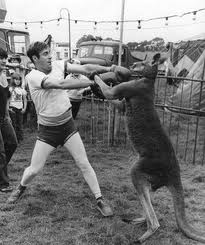There was this one time, Chapman and I went to Australia and New Zealand, and at a dinner in Melbourne, he thought it would be adventurous to order kangaroo.
 Tasted like deer.
Tasted like deer.
Now that I live in Brisbane, kangaroo meat is fairly easy to find; I just have no interest in it.
And like any other food, kangaroo is prone to contamination.
ABC reports that three years after Russia banned kangaroo meat after finding high levels of bacterial contamination, animal rights groups say there are still problems with hygiene in supermarket meat.
Some of the tests show high levels of E. coli.
The kangaroo industry says the tests are not scientific and it claims animal rights groups are extremists.
Animal rights groups are using the hygiene issue as a weapon to try and close down the industry, worth $75 million a year.
As part of their campaign, the animal rights groups purchased kangaroo meat for human consumption from Coles, Woolworths and IGA supermarkets in Sydney, Melbourne and Brisbane and had the samples tested in an independent laboratory.
Eight of the 26 kangaroo samples tested positive for the bacteria salmonella and 11 samples showed relatively high levels of E. coli bacteria.
The Kangaroo Industry Association says the laboratory results are not scientific because there is no way of knowing how the meat was transported from the supermarkets to the laboratory or how long it took to get there, and no independent scrutiny of the process.
Associate Professor Vitali Sintchenko says that illness from eating kangaroo meat is extremely rare, adding, “We haven’t seen any cases of food poisoning from – that we know of in New South Wales in the  last five or six years coming from kangaroo meat.”
last five or six years coming from kangaroo meat.”
The kangaroo industry also claims there has never been a recorded case of food poisoning from kangaroo meat in Australia. Now the industry is lobbying the Russians to reopen the meat trade. But last month, Animal Liberation took their lab results to Russia to try to persuade authorities there to continue the ban.
